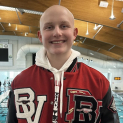Optimizing EGFR targeted therapy in pediatric malignant glioma.
Malignant glioma is a particularly aggressive form of brain tumor found in children and adults. Children with brainstem glioma, for example, live an average of ten months. The Epidermal Growth Factor Receptor (EGFR) is an overactive protein in a large number of these tumors and is associated with decreased survival. Drugs that block the function of EGFR have been developed but are only marginally effective in patients. My preliminary data suggest two explanations for this lack of efficacy: 1) While inhibitors of EGFR are effective in blocking the function of this protein, the function of an additional protein, MAP kinase, is able to rescue the cancer cells. 2) Current EGFR blocking drugs are not potent enough to inhibit EGFR sufficiently in malignant gliomas -a new class of EGFR blocking drugs called irreversible inhibitors appear to have increased potency. To address these problems, we show that we can increase the effectiveness of EGFR inhibitors in malignant glioma cells grown in petri dishes by combining these drugs with a second agent that blocks the MAP kinase protein or through the use of irreversible EGFR inhibitors. In studies proposed, we will expand our testing of combination therapy, using an EGFR blocking drug with a MAP kinase inhibitor in human brainstem glioma tumors transplanted into mice. In the second part of my proposal, I will use the newly developed irreversible inhibitors to EGFR to assess their effectiveness against pediatric glioma tumors transplanted into mice. If, as expected, we see a benefit in combining these agents in mice, this could pave the way for clinical trials using these drugs in the treatment of this horrible disease.

